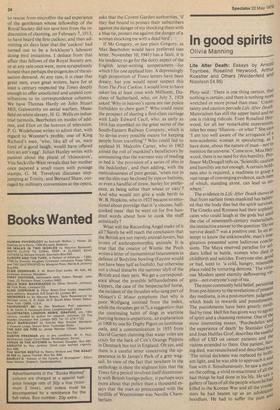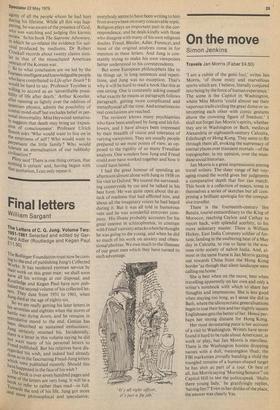In good spirits
Olivia Manning
Life After Death: Essays by Arnold Toynbee, Rosalind Heywood, ArthUr Koestler and Others (Weidenfeld and Nicolson £4.95) Pliny said : 'There is one thing certain, that nothing is certain ; and there is nothing more wretched or more proud than man.' Uncer tainty and caution pervade Life After Death. Materialism has still the upper hand and no
one is risking ridicule. Even Rosalind HeYwood, for all her remarkable experiences, titles her essay 'Illusion—or what ?' She says 'I am too well aware of the arrogance of a non-academic woman in speculating, as 1 have done, about the nature of man—not to mention the universe.' Come now, Miss HeYwood, there is no need for this humility. Professor McDougall tells us, 'Scientific caution and humility are not enough. A certain boldness also is required, a readiness to grasP vast range of converging evidence, each itetb of which, standing alone, can lead us no' where.'
The evidence in Life After Death shows as that from earliest times mankind has believ. ed that the body dies but the spirit survives' The Greeks and Romans had their sophisticates who could laugh at the gods but until the rise of nineteenth-century materialisnl, the instinctive answer to the question 'Do we survive death ?' was a positive one. In an attempt to know the unknowable, man's irnagination presented some ludicrous conclw sions. The Maya reserved paradise for soldiers killed in battle, women who died in childbirth and suicides. Everyone else, good or bad, went to 'a cold, hungry, miserable place ruled by torturing demons.' The virtuous Moslem spent eternity deflowering Vii" gins—not everyone's cup of tea. The most commonly held belief, persisting from pre-history to the revelations of present day mediums, is in a post-mortem judgment which leads to rewards and punishments' The punishments have been greatly modified by time. Hell fire has given way to ago'Y of spirit and a cleansing remorse. One of thje most interesting essays, 'Psychedelics Our the experience of death' by Stanislav ON; and Joan Halifax Grof, describes the easefw effect of LSD on cancer patients and the visions extended to them. One patient, haying died, was resuscitated and described how 'The initial darkness was replaced by brtlit; ant light, and he was able to approach it anue
fuse with it. Simultaneously, he saw a
on the ceiling, a vivid re-enactment of all bad things he had done in his life. He saw 3 gallery of faces of all the people whom he had killed in the Korean War and all the YourTt sters he had beaten up as an adolesd hoodlum. He had to suffer the pain an agony of all the people whom he had hurt during his lifetime. While all this was hapPening, he was aware of the presence of God, who was watching and judging this karmic review. In his book The Supreme Adventure, in which he co-relates the evidence for survival produced by mediums, Dr Robert Crookall records about twenty claims similar to that of the resuscitated American ,veteran of the Korean war. So to what conclusion are we led by the fourteen intelligent and knowledgeable people who have contributed to Life after Death? It would be hard to say. Professor Toynbee is willing to accord us an 'unverifiable possibilitY of life after death.' Arthur Koestler, after running us lightly over the oddities of quantum physics, admits the possibility of cosmic mind-stuff but excludes belief in pertonal immortality. Miss Heywood tentative
Y suggests that death may bring an 'expans on
i. of consciousness'. Professor Ulrich Simon asks 'Who would want to live on in the emptiness of Self? Who would want to Perpetuate the little family? Who would tolerate an eternalisation of our rubbishy civilisation ?' Pliny said 'There is one thing certain, that nitt°thing is certain' and, having begun with u'at quotation, I can only repeat it.



































 Previous page
Previous page